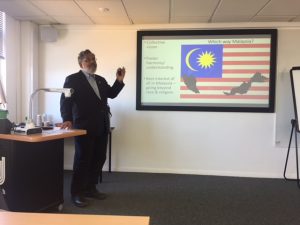
Sharing ideas and contextualising the historical and contemporary represents one of the ways in which we can broaden our understanding of international democratic ideals. We can recognise our place-in-environment as agents and the wider place of structures in forming, moulding and continuing policies that work for good or ill and choose to resist, adapt, or not, accordingly – not historicism but an agentic appreciation of the intertwining of the historical and biographical in shaping society and cultures. In this context, it was with great pleasure that we were able to welcome esteemed friend and colleague Professor Datuk Dr Denison Jayasooria to speak to staff and students about the changing democratic face of Malaysia.
Prof Denison is principal researcher in the Institute of Ethnic Studies at Universiti Kebangsaan Malaysia and Co-Chair of the Malaysian CSO-SDG Alliance. He has undertaken a great deal of work with SUHAKAM, the Malaysian Commission on Human Rights, and with the United Nations in Malaysia in establishing a trajectory towards meeting the Sustainable Development Goals.
Prof Denison rehearsed the formation of Malaysia and its history in colonial times, considering the ethnic composition mixed to provide jobs, administration and infrastructure in Malaya and the constitution promoted at independence that privileged one group to be ‘more equal than others’. He provided a post-colonial analysis of the contemporary issues facing modern-day Malaysia.
A fascinating insight into future possibilities, democratic change and development, with respect set firmly as the bedrock for such discussions, was articulated through four-arm model of the next few years. This model examined the various power structures in relation to Malaysia’s constitution and the various interpretations made of it:
- An Islamic Malaysia
- A secular Malaysia
- A Malay Malaysia
- A Malaysian Malaysia
Each model was seen to have some claim, whilst there is a need for inclusion, participation and human rights focus as Malaysia moves forward. The constitution formed the basis for discussion of the different types of Malaysia envisaged and indicates an area that is ripe for further study and analysis.
It was good to see staff and students from a range of social science disciplines, from the pure to the applied, who engaged vigorously with the ideas promoted. As the UK stumbles into an uncertain and dangerous future and its democratic claims become increasingly under attack, it is good to be reminded of the need for resistance to marginalisation, discrimination and exclusion but also respect for or engagement with the ‘other person’s view’. Prof Denison showed how by engaging with a range of different perspectives new ways of thinking about and doing politics can emerge. Of course, the human rights bedrock must be there for this to work, and Prof Denison clearly highlighted this need.











 Missing Persons Indicator Project Recruitment
Missing Persons Indicator Project Recruitment Celebrating our Research: Postgraduate Research Showcase 2026
Celebrating our Research: Postgraduate Research Showcase 2026 Nursing Research REF Impact in Nepal
Nursing Research REF Impact in Nepal Fourth INRC Symposium: From Clinical Applications to Neuro-Inspired Computation
Fourth INRC Symposium: From Clinical Applications to Neuro-Inspired Computation ESRC Festival of Social Science 2025 – Reflecting back and looking ahead to 2026
ESRC Festival of Social Science 2025 – Reflecting back and looking ahead to 2026 3C Event: Research Culture, Community & Cookies – Tuesday 13 January 10-11am
3C Event: Research Culture, Community & Cookies – Tuesday 13 January 10-11am ECR Funding Open Call: Research Culture & Community Grant – Apply now
ECR Funding Open Call: Research Culture & Community Grant – Apply now MSCA Postdoctoral Fellowships 2025 Call
MSCA Postdoctoral Fellowships 2025 Call ERC Advanced Grant 2025 Webinar
ERC Advanced Grant 2025 Webinar Update on UKRO services
Update on UKRO services European research project exploring use of ‘virtual twins’ to better manage metabolic associated fatty liver disease
European research project exploring use of ‘virtual twins’ to better manage metabolic associated fatty liver disease